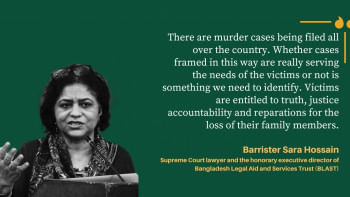Three key triumphs that define August 5

August 5 can be called a "second liberation" for Bangladesh because of at least three gains. First, it restored people's citizenship: the right to vote to choose their government and remove it when necessary. This is the first fundamental right in a modern state as it makes the government accountable to the people. Of course, we have learned that the right to vote alone is not enough, which is why we will need significant constitutional reforms.
However, even if it has limits, fair election is not an abstract concept for our people. Electoral democracy is intertwined with our history. Bangladesh was born on March 26, 1971, because the Pakistan government denied the sweeping 1970 electoral victory that sought to provide autonomy and power to the people of East Bengal. Instead, Pakistan sought to crush the people's voice through violence and genocide. The people, led by our Mukti Bahini, fought a nine-month war with relentless fierceness, and finally, with the help of our Indian allies, achieved liberation.
So, electoral democracy is in our blood, even today. Those who followed the TV news coverage of the January 2024 sham elections will remember that our youth, even those in their early 30s, poignantly stated that they have never had a chance to vote. It is a profound point that Prof Yunus has also made to the foreign press in explaining the force behind the July-August uprising. The resentment of being deprived of the right to vote ran deep and wide among the working people of both urban and rural areas. After all, that is the one right, and election day is the one day, where all people are truly equal.
The second gain was freedom from the lawless rule of a violent autocratic government, where those in power—politically and administratively, from the highest levels to the local organisers—acted with impunity. They collected tolls and bribes, arrested people under draconian laws or without any legal process, and in many cases, abused and "disappeared" them.
In the end, this autocratic government, drunk with power, decided it could order "shoot on sight" to kill its people. And so it did, killing nearly a thousand people and maiming and blinding thousands of others in the July-August uprising. It happened because a government mad with hubris and the greed-cum-fear of losing trillions of takas of corruption-begotten wealth had lost contact with reality.
Third, August 5 liberated us from a highly corruption-driven, unequal economy where government, oligarchs, and crony capitalists were bringing economic ruin. It has been highly frustrating for economists like me in the last few years to point out that beneath the glitz and lavish lifestyles of the crony capitalists and oligarchs, the fundamentals of the economy were cripplingly weak. Our economy under the past autocratic regime reminded me of the Titanic disaster: the economy was like that ship sailing at speed with lights blazing, bands playing, and lavish parties of the rich going on the upper deck, while below the water level, the hull was punctured in several places.
Ultimately, an economy runs and grows from two forces: its people and its capital. Under the last regime, the financial sector—the nerve centre of the economy that mobilises and distributes capital—was shallow and was becoming shallower. And it was becoming dangerously vulnerable. It was looted through white-collar financial shenanigans of loan defaults and by outright physically coercive takeover. Probably uniquely in the world, a single individual was allowed to own five banks whose deposits he merrily looted.
Private investment became shy, and foreign investment was virtually absent at a time when it was pouring into India and Vietnam. Public investment increased markedly but in a scattershot way without proper evaluation, creating white elephants that became a conduit for grand-scale corruption. One sad example is the significant investments in power generation that have simultaneously resulted in much percent excess capacity and financial bankruptcy. While we still suffer from blackouts, the public has to fund a $3 billion deficit.
In terms of human capital, the education system was in disarray. Over a fourth of our teachers are untrained, and hundreds of primary schools lack a headmaster, resulting in low-quality learning. Bangladesh students ranked near the bottom of countries in terms of learning competency. Although Bangladeshis had 11 years of schooling on paper, in reality, it was only six years due to poor quality. Additionally, technical and vocational communication for students was neglected, leaving the economy with critical technical skills. Similarly, the inadequacy of higher education was evident in the 30 percent unemployment rate of national university graduates. At the same time, we needed to employ a large number of foreign workers and pay them billions of dollars in salary because it provided us with the technical and managerial skills our education system could not provide.
And then there was the rise of the oligarchs under the last regime, which stifled competition, the lifeblood of a dynamic economy. They prospered through the largesse of public sector contracts, loan defaults, tax forgiveness through so-called "whitening" provisions in the budget, and land grabbing.
They also enjoyed the protection of the walls of high tariffs and supplementary taxes of more than 25 percent—the highest in the region and much higher than the ASEAN tariffs of 6 or 7 percent—so they could enjoy high profits in a captured domestic market. Not surprisingly, the not-so-efficient capital-intensive industry grew up owned by these oligarchs who also crowded out small and medium enterprises. They had little incentive to become competitive and compete internationally in exports. Not surprisingly, we lost ground in international markets. In 2012, exports made up 20 percent of our GDP. Ten years later, exports make up only 13 percent. And this while, here's the shocker: India and Vietnam have export-GDP ratios of 22 percent and 94 percent.
Around 2010-11, Bangladesh had the global reputation of an emerging East Asian manufacturing tiger—often mentioned side by side, in the same breath, with Vietnam. Instead, today, it has become another low-competitive, tariff-protected, oligarch-dominated, inward-looking South Asian economy.
With falling competitiveness, manufacturing, and urban employment growth markedly fell. Real wages have been on the decline for several years now. Without productive employment opportunities, good earnings, and quality education and technical training, we now risk missing the demographic dividend that a young population brings. Deprived of opportunities, the aspirations of the young population could turn into resentment and social unrest, turning a demographic dividend into a demographic disaster.
But what of the high growth rates of about 6 percent per annum that we saw under the past regime? The perfect analogy is that it was like Pakistan's Ayub Khan's decade of development from 1958-68—it was of poor quality, unsustainable, and ultimately a chimera. Highly skewed towards the wealthiest 22 oligarch families, excessively regionally concentrated and unequal, it ended up breaking Pakistan. There are other examples around the world, too.
In Bangladesh's case, growth is mainly owed to the hard-earned foreign exchange earnings of our exporters and the seven to eight million expatriate workers, the rise of manufacturing, entrepreneurially minded people supported by thousands of NGO workers, and the sweat of our farmers. But growth was also debt-driven. Our entire public sector investment was debt-financed, including several over-charged and over-leveraged mega public sector projects. Yes, oligarchs and officials also made profits from it. However, such growth is a chimera, without fundamentals, and unsustainable, as is evident from the sharp slowdown of the economy in the last few years.
The gains of liberation are evident not only in avoiding disasters brought about by past rule but also in the forward movement already made by the new government. The Bangladesh Bank has embarked on an aggressive monetary policy of raising policy rates to reduce inflation and trade deficits, while increasing reserves. It has made it clear that it would not intervene to sell dollars in the market or print money. The boards of the weakest banks—some insolvent—have been reconstituted to prevent further raids on the balance sheet. At the same time, a banking commission has been set up to identify mergers and acquisitions and other strategies to protect depositors.
The finance ministry is on track to significantly reduce deficits and government borrowing not to put pressure on interest rates and inflation and crowd out the private sector. The planning ministry has taken steps to prioritise development spending and, in a much welcome step, announced that its future emphasis would be on human capital investment.
In education, our adviser brought relief by decisively rejecting the radical new curriculum introduced by the last government that was highly unsuited for the country. Emphasis has been placed on technical training, where Bangladesh lags far behind other countries. In environment and water, there is clarity and commitment by our experienced adviser to rescue our dying rivers and harness them.
As the chief adviser has mentioned, if there is a brand name for the interim government, it is "reforms." Many of these reforms have already started. More are in preparation. The task now will be to deepen and protect the reforms so that the gains of the August liberation to restore democracy and rescue the economy will last.
Dr Ahmad Ahsan is director at the Policy Research Institute of Bangladesh, a former World Bank economist, and a Dhaka University faculty member. He can be reached at [email protected]
Views expressed in this article are the author's own.
Follow The Daily Star Opinion on Facebook for the latest opinions, commentaries and analyses by experts and professionals. To contribute your article or letter to The Daily Star Opinion, see our guidelines for submission.

 For all latest news, follow The Daily Star's Google News channel.
For all latest news, follow The Daily Star's Google News channel. 











Comments